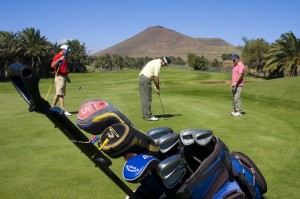What Are My Chances of Making the Champions Tour (Or at Least Hitting the Golf Ball Really Far)?
 Photo: Sands Beach Lanzarote
Photo: Sands Beach LanzaroteDespite the fact that I am not very good at golf, my secret fantasy is to someday play on the Champions Tour, the professional golf tour for fifty-somethings. As I approach my 44th birthday, I realize that it is time to get serious in this endeavor.
The right way to spend my time if I really wanted to make the Tour, I suppose, would be to practice more. My friend Anders Ericsson popularized the magic number of 10,000 hours of practice to become an expert. Depending on exactly what you count as practice, by my rough calculations I have logged about 5,000 hours of golf practice over the course of my life. Given how mediocre I am after the first 5,000 hours, however, I’m not so optimistic that the next 5,000 hours will lead me anywhere good.
So instead, I spent some time today figuring out how just how much I will need to improve. The best PGA tour pros tend not to have regular handicaps, but are said to be the equivalent of Plus 8 on the handicap scale, i.e. eight strokes better than a scratch golfer. I claim to be a six handicap. That means that, to a first approximation, if I played 18 holes today against the best players in the world, I should lose by 14 strokes.
The probability that I will improve by 14 strokes in the next six years is easy to estimate: zero.
Fortunately, my goal isn’t to be the best golfer in the world, just to be the worst golfer on the Champions Tour. Surely, that can’t be so hard, can it?
So I set out to measure just how much worse that guy is than the world’s very best golfers. A direct comparison is hard to make because the bottom feeders on the Champions Tour rarely play against the Tiger Woodses of the world. The stars of the Champions Tour do, however, play an occasional PGA Tour event. I was able to find 19 players who competed on both tours in 2010. On average, these players had a stroke average of 70.54 when playing on the Champions Tour, compared to an average of 71.77 when they played PGA Tour events. This suggests that the typical Champions Tour course plays a little more than one stroke easier than the typical PGA Tour course.
The top players on the PGA Tour post average scores of a little below 70 strokes per round, meaning that the upper echelon of senior golfers are about two strokes worse per round than the best players in the world. The low performers on the Champions Tour score around 73 on Champions Tour courses, or about two-and-a-half strokes worse than the top senior golfers. If the world’s best golfers are Plus 8 handicappers, then that means the “bad” golfers on the senior tour are roughly Plus 3 or Plus 4.
That’s “only” nine or ten strokes a round better than me. Surely I can close that gap! If I can squeeze merely one stroke of improvement out of each incremental 500 hours of practice, then by the time I hit 10,000 hours, I will be a Plus 4.
With that goal in mind, I recently started taking golf lessons for the first time since I was 13 years old. One reason I chose my new golf coach, Pat Goss, is that he was an undergraduate economics major at Northwestern. I thought maybe he would understand the way I think.
On our first meeting, Pat first told me I swing like a character out of Caddyshack, and then asked me what my goals were in golf.
I responded to his question with 100 percent honesty: “I want to play on the Champions Tour. But if you decide I’ll never be that good, then I have a very different objective. I don’t care the slightest bit about what my handicap ends up being in that case. All that matters to me then is being able to hit the ball as far as possible, even if I can’t break 100.”
I guess he’s not used to getting an honest answer to this question, because he was so overcome with laughter he practically fell to the ground.
The good news is that six lessons later we are still devoting time to perfecting my short game, suggesting he thinks I can achieve my dream of making the tour.
Or maybe he’s just maximizing revenue. After all, he is an economist by training.

Comments